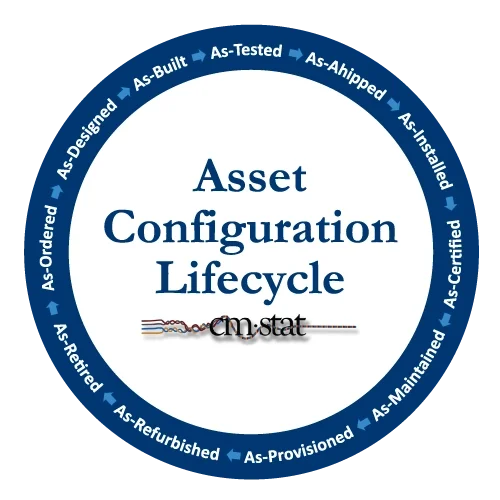EPOCH Configuration Management Applications
Inside EPOCH CM : Overview l Applications l Capabilities l Functionality l Benefits l Case Study Coming Soon l Resources l FAQ Coming Soon! l Demonstration
The EPOCH CM software solution, like its predecessor PDMPlus, is a rapidly-deployable best-in-class configuration management application for use in industries with long-life products, equipment, systems and other assets that may operate for years undergoing numerous upgrades, repairs, refurbishments, and configuration changes in the field.
These industries include: aviation, aerospace & defense, marine, rail, transportation, industrial equipment, energy and other high-tech industries. Example user requirements and application uses of EPOCH CM in these industries include for:
Hardware Configuration Management
Asset Lifecycle Configuration Management
New Product Development Configuration Management
In-Service and Fielded Equipment Configuration Management
As-Designed, As-Manufactured, As-Deployed, As-Repaired Configuration Management
Fleet Maintenance Configuration Management
MRO Configuration Management
Aftermarket Service, Repair and Refurbishment Configuration Management
Model Based Digital Twin Configuration Management
Tech Pubs, Manuals, & Documentation Configuration Management
Procurement, Logistics & Supply Chain Configuration Management
Regulatory Compliance Configuration Management
R&D Lab and Testbed Configuration Management
Site and Network Configuration Management
Systems Engineering Configuration Management
These application all share in common the need to perform rigorous configuration management over the “long digital tail” of the As-X product lifecycle beyond the OEM’s original As-Designed, As-Built, and As-Released configuration.
The use of Configuration Management software within these different industries and varied application uses is driven by many of the same problems, pains, and performance gaps. Which of these configuration management challenges does your organization experience?
the sheer volume, complexity, and variations in configurations of component parts, design requirements, product deployments, and complete systems overwhelms legacy methodologies, spreadsheets, and software tools
the actual as-deployed and as-maintained configuration has evolved to be very different from what was as-shipped or as-installed
time and effort required to find and verify accurate configuration information eats into the project schedule
lack of confidence in producing upon demand real-time live configuration of deployed assets by specific lot number or serial number
discovery of where-used and analysis of change-impact on as-deployed configurations is unwieldy or untrustworthy, especially for systems operating far downstream of the OEM’s engineering release
management of processes that create, use, or revise configuration data is absent, ad hoc, or broken; much less automated or optimized
losing track of the change process due to changes being made without approval or enterprise awareness, or change history information unavailable, inaccurate, or obsolete
losing configuration control prior to delivery with products produced that are not conforming to requirements, or data and document deliverables not conforming to what was released
losing configuration control after delivery from not being able to track what components are installed on serialized end items
what’s actually bid or delivered by the contractor is not what was specified or bought by the customer
failing the Product Configuration Audit mandated by the contract or program office
lack of baseline configuration management visibility along with inability to identify and track configuration items over their individual lifecycles
processes and procedures for mass customizations and variant management are themselves one-off customizations
difficulty in keeping all the different or downstream BOMs accurate and synchronized with engineering changes across all product variants or lot/serial numbers
installing unauthorized parts, purchasing obsolete parts, and work stoppage due to lack of approved parts
parts produced for the wrong configuration without visibility to alternate or substitute parts that are authorized due to lack of proper communication and documentation
software versioning and releases not compatible with hardware releases
manufacturing inventory, tooling, and processes are misaligned with product configurations
reject, rework, or scrap rates are too high due to old or wrong specifications
installation instructions, work orders, test procedures, training manuals and service bulletins are often obsolete because of configuration inaccuracies
integration and complexity of CM for the supply or service chain that has design and change authority
configuration of digital twin models for service is hard to create or maintain, much less synchronize with the actual physical asset
service contractors not having access to the OEM’s product configuration data or being overly-constrained to use only that product data
completeness, accuracy, and security of data retention and document repository is undependable
extended lifecycles of assets that are in-service for decades creates extraordinary LOTAR burden on CM data
sustainment groups are unable to locate documentation or other historical artifacts
failure to maintain, document, and track ITAR Compliance
certification and other documentation records not matching the true status of the deployed configuration
without a CM Plan the requirement for CM processes and tools are constantly in flux
program management and project budget suffers due to a lack of visibility into CM problems and challenges
Next, learn about the capabilities of EPOCH CM that allow it to address these challenges by examining EPOCH CM Capabilities.
Receive CMsights
Subscribe to CMsights News for the latest updates from CMstat on Configuration Management, Data Management, EPOCH CM, and EPOCH DM.
Request a Demo
See how EPOCH CM and EPOCH DM support industry standards and best practices in Configuration Management and Data Management


